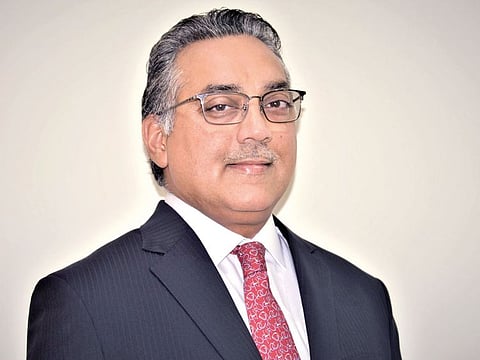'We are one step ahead of cyber criminals'
Gurcharan Chhabra, Head of the Fraud Prevention & Intelligence Division for Mashreq

The reality is that online fraud and scams have existed for a long time, says Gurcharan Chhabra, Head of the Fraud Prevention & Intelligence Division for Mashreq, in an exclusive interview with Gulf News.
"Since the prevalence of the internet, fraudsters have found new and innovative ways to defraud people out of their hard-earned money. And it is only natural they would try to take advantage of this current situation – they know that people are at their most vulnerable in these challenging times. Therefore, it is necessary for financial institutions, as well as customers to remain vigilant."
"At Mashreq, this is something we take extremely seriously. There are several checks and balances in place to ensure that we are one step ahead of cyber criminals. For instance, we monitor customer behaviour and patterns which alert us to anomalies. There are several other digital security features, such as multi-factor authentication systems, which ensure the security of our customers."
"Having said that, any security system is only as good as the end user. In essence, the most important thing is awareness, and at Mashreq, we take a pro-active role in this arena - by maintaining regular contact with our customers to ensure that they are informed about common schemes executed by fraudsters. We have launched several initiatives, as well as campaigns across our touchpoints to ensure that they are aware of the various scams. Let me reiterate that no genuine bank employee would ever ask a customer for his or her account login details; that’s something we should all bear in mind.”
Simple tips to protect against fraud:
Preventative measures
1. Register for SMS and email alerts to stay informed about transactions on your bank accounts
2. Never respond to unsolicited calls/texts messages asking for your bank account details
3. Look out for small differences in domain names or email addresses
4. Be careful when sharing personal information on social media platforms
5. If you receive an unexpected request, first confirm using a different means of communication
6. Beware of phishing websites
7. Use strong, unique passwords and change them regularly
8. Do now click on links or download and open any attachments in case of any suspicion
9. Do not reveal passwords or other sensitive information to any individual directly or through email or phone
10. Never respond to suspicious emails
Reactive measures:
1. If your mobile has stopped working for unusual reasons, check with your mobile operator immediately
2. Call your financial services provider the minute you see unusual activity in your transactions or feel that you have become a victim of fraud
How are new technologies changing the way you fight against money laundering and fraud?
The financially industry across the world has made several breakthroughs in technology, especially when it comes to artificial intelligence, robotics or machine learning over the past 10 years. I have no doubt that this will inadvertently transform industries, as well as the global economy. Naturally, this includes banks.
Artificial Intelligence (AI) in particular, can help immensely with fighting financial crimes, such as money laundering and funding of terrorism, amongst others. And this brings two main benefits for the banks that are trying to fight this menace. For starters, AI deployment in such cases can increase the effectiveness and efficiency when it comes to the investigation of financial crimes. Secondly, and equally importantly, it helps with financial risk management for the bank. In essence, while these are just a couple of examples, it is imperative that banks deploy these new technologies to stay one step ahead of criminals and ensure that their services are not used for nefarious activities.
What are the common types of security threats that customers in this region face?
Fraudsters use all means to defraud unsuspecting customers and all kind of financial frauds such as online banking fraud, cheque fraud, loan fraud, fund transfer fraud, sim swap fraud, social engineering fraud (phishing, vishing, smishing), and e-mail redirection fraud amongst others. This happens in all regions, all the time and it also sees a cyclical high on specific frauds during different periods.
What do customers need to keep in mind while doing transactions online?
Never conduct banking transactions using a public computer or Wi-Fi and only do it on your personal device. Always ensure that your personal device has the latest operating system and antivirus installed. It is best practice to not download unknown applications, software, rooting or jailbreaking devices on your personal device. Customers should choose strong and unique passwords and never share those with anyone. Finally, never share personal details and security information like card numbers, you CVV or OTP with anyone.
Sign up for the Daily Briefing
Get the latest news and updates straight to your inbox



